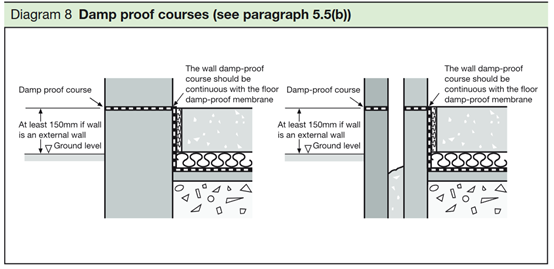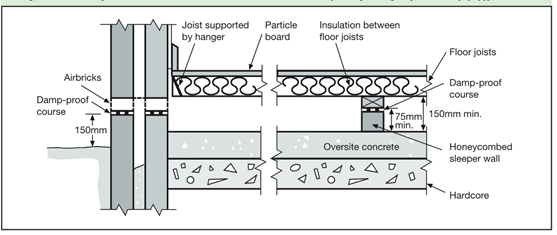A lot of clients want to check on their damp proofing around this time of year, so you’re probably having quite a few enquiries and requests for damp surveys and quotations. This aspect of construction and maintenance is so critical to a home’s durability, as well as health and safety, so there are strict regulations that must be followed when damp proofing a home. Even a few millimetres of Damp Proof Course (DPC) or Damp Proof Membrane (DPM) can be significant.
We know how tough it can be to keep on top of government regulations when you’re focused on doing the hard work, so we check these details regularly to help you stay on track and provide your clients with the best quality and results.
Most of us in this industry know the answer all too well, but just to clarify: this is a set of rules laid out by the UK government and enforced by local authorities, which apply to most structures in the UK.
The regulations relating to damp proofing and DPC are found in HM Government’s ‘Approved Document C – Site preparation and resistance to contamination and moisture’ of The Building Regulations 2010.
Different sections of the building regulations have changed and continue to change at different times. In this case, the last updates took place in 2013.
Remember that not following building regulations can result in prosecution, as well as serious fines and penalties. If a home isn’t built according to regulations and something goes wrong, a contractor can be liable for all sorts of costs, and would most probably lose professional accreditations and be removed from associations too.
DPC barriers are required when constructing new buildings to prevent rising damp, and in some cases, it can also help prevent penetrating damp or water ingress. There are different regulations for walls and floors, as these face different risks and causes of damp – rising damp as well as penetrating damp and condensation must be protected against.
Damp Proofing Wall Regulations:
If it’s an external cavity wall:
Damp proof courses: Diagram from www.gov.uk – Approved Document C

Sometimes, e.g. in older buildings, it simply isn’t possible to insert the DPC 150mm above external ground level. If this happens, there are ways to work around it with external drainage, but please check specific regulations as they apply to your project and plans!
Damp Proofing Floor Regulations:
DPC may also be needed:
Suspended Floor Construction: Diagram from www.gov.uk - Approved Document C

Of course, there are many more details in these regulations that will only come up in specific circumstances, so always check the details for a new project carefully.
Harlestone Supplies stocks a range of excellent quality DPC and DPM, with handy sizing options to make fitting even simpler for you.
Get in touch with our team to find the sizes and quantities you need, with easy online ordering and speedy delivery! We’re proud to support local contractors and professionals, and we’re always here to help if you have any questions – give us a call on 0160 4581444
Harlestone Group Limited
Harlestone Firs
Harlestone Road
New Duston
Northampton
NN5 6UJ
We are open Monday - Friday 08.00 - 16.30
We are closed Saturdays, Sundays & Bank Holidays.
